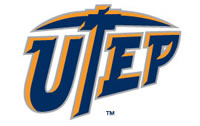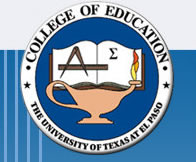
Bill Robertson, Ph.D. - Classes
Teacher Education Department
EDT 5373 - Advanced Productivity Technology Classroom
Syllabus
Instructor: Dr. Bill Robertson
Phone: 747-8608
Office: Education Building, Room 606
Email: robertson@utep.edu
Web Site: http://utminers.utep.edu/robertson/classes/ted5314/default.htm
Office hours: By Appointment
Class Meetings
Mondays, 4:30-7:20 PM, Room 411 , Spring 2006
Required Text
Fewell, P.J. and Gibbs, W.J. (2005). Microsoft Office for Teachers (2nd Edition) . Upper Saddle River , NJ : Prentice Hall
Reference Text
Morrison, Gary R. and Lowther, Deborah L. 2004. Integrating Computer Technology into the Classroom (3 rd Edition). Upper Saddle River, NJ: Prentice Hall
Required Software
Microsoft Office. Please buy a copy of the software from the UTEP Bookstore. It is about $25 for the entire Office Suite.
Course Description
This class focuses on curriculum strategies that utilize word processing, presentation programs, and spreadsheets for the EC-12 classroom; development and use of databases; extended web page creation integrating graphics, web-page scripts, and file transfer; creation and implementation of online collaborative projects; continued portfolio development and peer mentoring experiences .
Goals
Technology can be an ally to the modern teacher, and should be effectively integrated into the presentation and demonstration of the curriculum. This takes a different style of teacher, one who learns from students and also models the use of technology in the classroom (Duffy et al. 1986). Today’s student needs to be stimulated, and since technology is an integral feature of the modern world, to not use it in the classroom is a real disservice to the student. In science, "technology provides the eyes and ears of science - and some of the muscle too" (Rutherford and Alhgren, 1990). Technology, whether it is a computer or a calculator, is vital to teaching the concepts associated with data collection, computation and measurement. It is also something that is recommended by educators in such volumes as the National Science Standards and the National Mathematics Standards
Course Objectives
- Gain fluency in using word processing, presentation programs, spreadsheets, databases and web pages for EC-12 student projects as well as the information management system of WebCT. (MTTS 1 and 4)
- Apply effective instructional design for various interactive media, instructional frameworks, and applications. (MTTS 2)
- Discuss how innovations such as the Internet, web communication tools, computer-supported collaborative learning, and online communities are shaping the evolution of distributed traditional education. (MTTS 3)
- Develop an electronic portfolio of class projects. ((MTTS 5)
Course Requirements
- Attendance and participation in class sessions -- whether face-to-face or virtual -- is mandatory, as discussions and shared experiences are important parts of the course. The class schedule may change as the course progresses; changes will be posted on the WebCT course website. Numerous absences may adversely affect your grade.
- Students missing a class are responsible for completing any exercises, readings, etc. as well as writing a one-page essay on the readings before the start of the next class.
- Each student is expected to complete all readings, exercises, and written assignments, as well as to participate in class and electronic discussions.
- Students missing the due date for an assignment must make immediate arrangements with the instructor to fulfill that requirement before the next class meeting.
- To enable individualization of the course to the needs of each student, special arrangements on requirements and assignments may be negotiated in writing with the instructor. Revised assignments typically involve direct, extensive involvement in some project engaged in the design, development, implementation, or evaluation of an emerging educational technology.
- This is an advanced class; participants are expected to have experience in using technology-based educational applications and a general background in educational theory.
Class Activities
This course will utilize a combination of lectures, hands-on experiences, media, discussions, online activities and projects to help participants understand the strengths and limits of current technologies, as well as the likely evolution of distributed learning.
Class Assignments
Each student is expected to complete two large projects and a series of class assignments. The overall grade for the class for each student will be calculated as follows: 10% Daily Attendance & Participation, 20% Mid-Term Product and Presentation, 40% Online Quizzes, Online Assignments and Online Discussions, 30% Final Product and Presentation.
Grading
A: 90% - 100%, B: 80% - 89%, C: 70%-79%, D: 60%-69%, F: <60%
Academic Dishonesty
Academic dishonesty is prohibited and is considered a violation of the UTEP Handbook of Operating Procedures. It includes, but is not limited to, cheating, plagiarism, and collusion. Cheating may involve copying from or providing information to another student, possessing unauthorized materials during a test, or falsifying research data on laboratory reports. Plagiarism occurs when someone intentionally or knowingly represents the words or ideas of another person’s as ones’ own. And, collusion involves collaboration with another person to commit any academically dishonest act. Any act of academic dishonesty attempted by a UTEP student is unacceptable and will not be tolerated. Violations will be taken seriously and will be referred to the Dean of Students Office for possible disciplinary action. Students may be suspended or expelled from UTEP for such actions.
Students with Disabilities
If you have or believe you have a disability, you may wish to self-identify. You can do so by providing documentation to the Office of disabled Student Services located in Union E Room 203. Students who have been designated as disabled must reactivate their standing with the Office of Disabled Student Services on a yearly basis. Failure to report to this office will place a student on the inactive list and nullify benefits received. If you have a condition which may affect your ability to exit safely from the premises in an emergency or which may cause an emergency during class, you are encouraged to discuss this in confidence with the instructor and/or the director of Disabled Student Services. You may call 747-5148 for general information about the Americans with Disabilities Act (ADA).
Syllabus | Schedule | Assignments| Discussions | Student Products| Evaluation | Resources | Links

Bill Robertson, Ph.D. (robertson@utep.edu)
Teacher Education Department, College of Education, University of Texas at El Paso